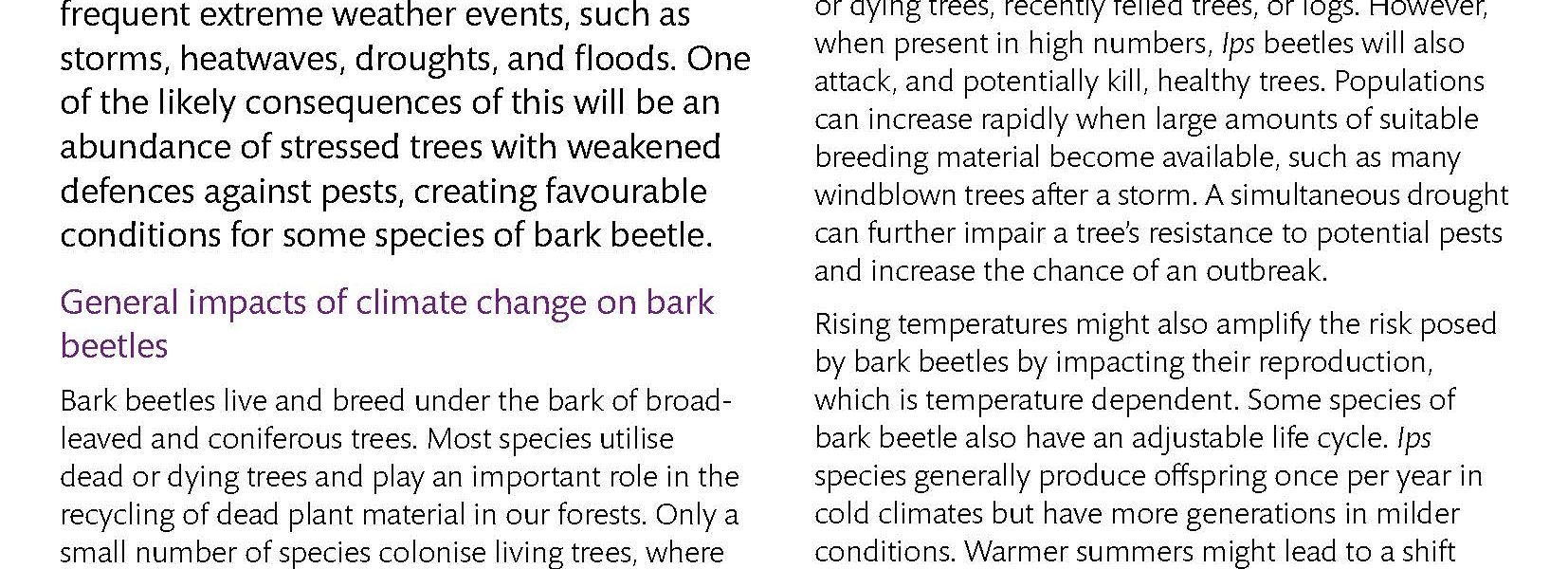We use some essential cookies to make this website work.
We’d like to set additional cookies to understand how you use forestresearch.gov.uk, remember your settings and improve our services.
We also use cookies set by other sites to help us deliver content from their services.

How will the changing environment impact bark-boring insects? Climate change projections indicate more frequent extreme weather events, such as storms, heatwaves, droughts, and floods. One of the likely consequences of this will be an abundance of stressed trees with weakened defences against pests, creating favourable conditions for some species of...
Overview Resilience to climate change, the threat of pests and diseases, tackling the biodiversity crisis, and the implications of these issues for the future of the tree and woodland sector are necessarily being foregrounded in management discussions. Sycamore is a naturalised, fast-growing, and adaptable species with increasing evidence to support...
Climate change presents one of the greatest long-term challenges facing the world today.
Resources relevant to forests and climate change. General The National Adaptation Programme Making the country resilient to a changing climate (2013). HM Government. Environmental Reporting Guidelines: including mandatory greenhouse gas emissions reporting guidance (2013) Defra, London. Government forestry and woodlands policy statement, incorporating the Government’s response to the Independent Panel...
Archived Forestry Commission booklet discussing forests and climate change.
How woodland management can adapt in anticipation of climate change
What are the key risks to our forests and woodland? There are many risks to UK forests, woodlands and trees from climate change trends and extreme weather events. These risks can be managed to reduce the potential impact on our forests and the ecosystem services they provide. This factsheet highlights...
How can careful choice of provenance of planting stock make forests more resilient to the changing climate? Provenance is a forestry term used to describe the location of the stand from which reproductive material (seeds or cuttings) was collected. The choice of provenance of planting stock used to establish new...
Project developing the Climate Change Hub to support and engage forestry practitioners in climate adaptation and mitigation efforts.
Cookies are files saved on your phone, tablet or computer when you visit a website.
We use cookies to store information about how you use the dwi.gov.uk website, such as the pages you visit.
Find out more about cookies on forestresearch.gov.uk
We use 3 types of cookie. You can choose which cookies you're happy for us to use.
These essential cookies do things like remember your progress through a form. They always need to be on.
We use Google Analytics to measure how you use the website so we can improve it based on user needs. Google Analytics sets cookies that store anonymised information about: how you got to the site the pages you visit on forestresearch.gov.uk and how long you spend on each page what you click on while you're visiting the site
Some forestresearch.gov.uk pages may contain content from other sites, like YouTube or Flickr, which may set their own cookies. These sites are sometimes called ‘third party’ services. This tells us how many people are seeing the content and whether it’s useful.